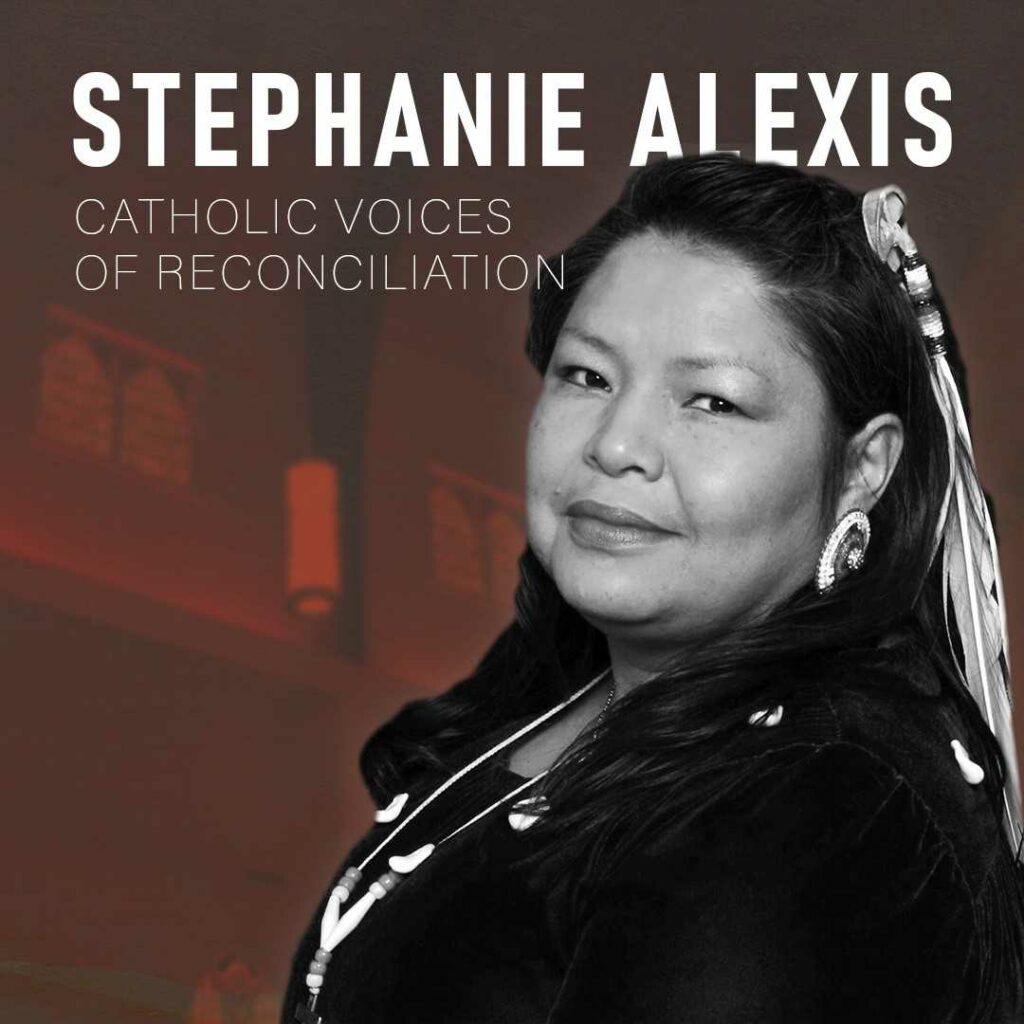Catholic Voices Of Reconciliation is a series of interviews with Catholic First Nation individuals who were a part of Pope Francis’ visit to the Edmonton Archdiocese. We asked each of them three questions about their experience as both followers of Christ and First Nations people and practical ways that local Catholics can support truth and reconciliation.
Stephanie Alexis is from the Alexis Nakota Sioux First Nation. Her grandfather was a residential school student. She is a lifelong Catholic and a member of Lac Ste. Anne Parish within the Archdiocese of Edmonton Alberta. She was a member of the local organizing committee and she was present when Pope Francis visited Lac Ste. Anne.
What is one way that the pope’s visit has impacted you?
Personally, it has been such a healing treasure for me. That have been many things that God has brought to light in my life and it’s really beautiful. I always pray for the conversion of our Indigenous people because of the trauma that we went through, a lot of my relatives have lost faith because of the trauma.
On the other side, there are people like my family that continue to be faithful because we have a strong relationship with our Lord. We know Jesus intimately. . . so I always pray for conversion, and I believe that it will happen all according to God’s will. I ask God to bless our people and that they would know Jesus.
For me, it has always been a dream to see the pope come here. I actually met the Holy Father at the Lac Ste. Anne visit. I was part of the delegation that received him privately. I let him know that I dreamt that he came to my community, 20 years ago. I had a dream that the pope came down on a helicopter and I was showing him my community. And I always wondered, ‘Why did I dream that?’ Just seeing him. . . talking to our elders and leaders, I told him about the dream and [I said] ‘I thank God you are here.’”
When the decision came out in [that the pope was coming to Canada] it was just like ‘Thank you God!’ This wound that has been covered for so long – that is what residential schools were to us – it opened up. And as believers, we can now reconcile.
I’ve always loved the Lord and his Church, all the sacraments, and I pray that other people will see the beauty of it. And yes, we are human. . . I know the flesh is weak. . . and the Evil One is always there lurking. . and unfortunately, that has happened to a lot of our people. I’m not one to judge, but that is what we are up against. [The Evil One] is separating our people.
A lot of our young people are hating our Church and they shouldn’t be doing that. And I know the Evil One, that is his work. So we need to bring them back gently. And the Holy Father coming, it was beautiful and healing. It was gentle.
What is one, practical way that people in your local community can support the continued healing between First Nations people and the Church?
Personally, just give Indigenous people space, and respect.
I know the Church has. . . rules, but they need to open them and allow more space for Native culture in the Church.
For example, there was “smudge” (incense offering) that the Jews, that they used for the altar. We have smudges too in our tribe. We have seven smudges in our tribe. This is where our culture can fit in. We are very fortunate because we have Fr. Leszek [Kwiatkowski, pastor at our churches in Lac Ste. Anne] who allows us to smudge with our own smudge in the church. He has allowed it. I think for him, that is part of reconciliation.
The other thing we do is drum in the Church. . . So there are some things that need to be tweaked in order to help people feel part of the Church.
What is one way that the efforts towards truth and reconciliation have blessed you personally?
Understanding the history of our people – and I was raised Catholic when [residential school court cases] were taking place. They were coming around taking elder statements and asking them to participate in [court cases] if they wanted to. And a lot of our elders didn’t want to sue the Church, they thought it was wrong.
So, I was just young, in my 20s, when this was coming out. My Grandpa was in residential schools and he experienced some really horrific things. . . like a nun made him kneel on pencils and he had to kneel for hours so that he would stop speaking his language. How do you make a little boy do that? That is awful.
It’s disheartening, you know?
When I think about reconciliation, that’s what I think about: I want the families to be healed and reconciled with God. To me that’s important.
And the thing about our tribe – Alexis First Nation – before residential schools came into our way of life, our people were already engaged with the Church. The chief that signed the treaty here was baptized, and everyone got baptized. And that was before residential schools were around.
There’s this idea that residential schools made us Catholic, no they didn’t! A lot of our young people think that. So when I think of reconciliation: they need to know the truth, to know the history.
Jenny Connelly – Archdiocese of Edmonton

